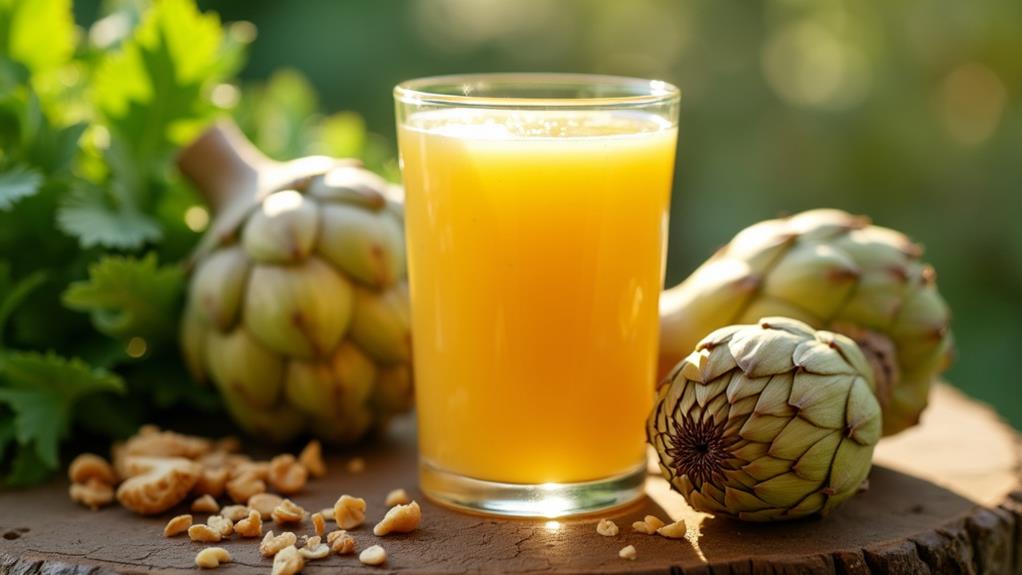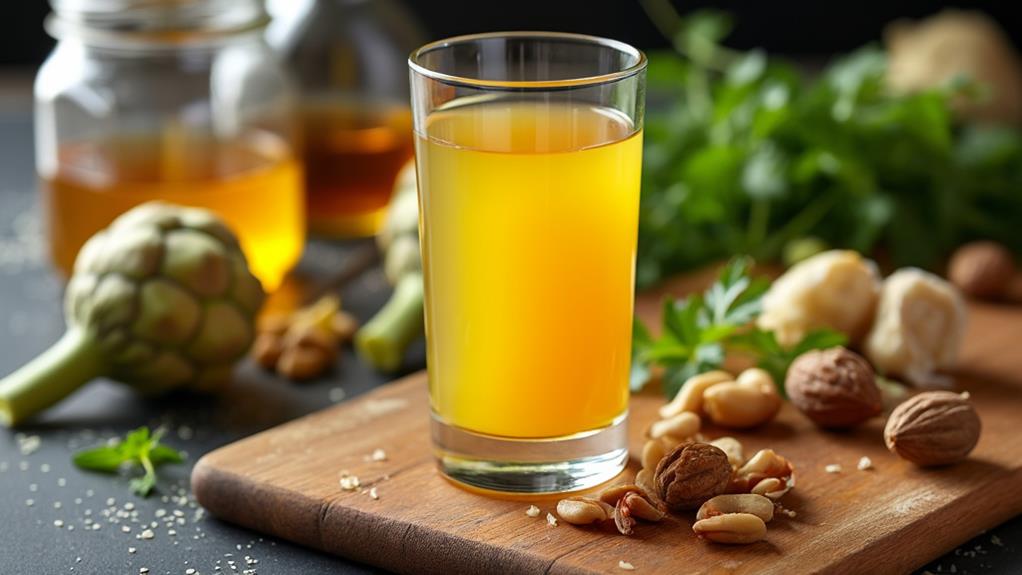Jerusalem Artichoke Juice: Nutty, Sweet, and High in Digestive Fiber

Jerusalem artichoke juice offers a nutty and sweet flavor while being packed with digestive fiber, particularly inulin, which supports gut health. This juice, from tubers in the sunflower family, is low in calories and has a low glycemic index, making it ideal for weight management and blood sugar regulation. Rich in potassium and containing different vitamins and antioxidants, it complements your nutritional intake. You can enjoy it in smoothies or as a standalone health drink. If you're curious about how to prepare it and its full range of benefits and uses, there's plenty more to investigate.
Understanding Jerusalem Artichokes
Jerusalem artichokes' nutty, sweet flavor and crunchy texture make them a unique addition to your diet. As tuberous roots from the sunflower family, they're not only tasty but also advantageous for your gut health. High in inulin, a powerful prebiotic fiber, Jerusalem artichokes support the growth of beneficial bacteria in your digestive system. This, in turn, plays a crucial role in maintaining a healthy gut microbiome, which is important for your general well-being.
You might wonder how inulin impacts your health beyond digestion. By promoting the growth of good bacteria, inulin helps strengthen your immune system. A robust gut microbiome can influence your body's ability to fend off illnesses, making Jerusalem artichokes a delicious way to support your immune defenses. These tubers can be enjoyed raw or cooked, adding versatility to your meals while improving your health.
Incorporating Jerusalem artichokes into your diet doesn't just improve flavor; it also contributes to a sustainable lifestyle. Often grown using organic practices, these non-GMO tubers are an eco-friendly choice. By choosing Jerusalem artichokes, you're not only nurturing your gut health but also supporting sustainable agriculture.
Nutritional Profile and Benefits
You'll find that Jerusalem artichoke juice packs a nutritional punch with its high concentration of inulin. This prebiotic fiber supports your gut bacteria, promoting digestive health. Inulin is the star player, making Jerusalem artichokes a powerhouse for your digestive system. With only 73 calories per 100g, it's a nutrient-dense option for weight management, letting you enjoy a healthful diet without the guilt.
Jerusalem artichoke juice is also rich in potassium, offering about 429mg per 100g. This essential mineral helps regulate blood pressure and maintain electrolyte balance, which is fundamental for general well-being. Including this juice in your diet can support your cardiovascular health effectively.
Moreover, the juice contains vitamins and antioxidants that improve your nutritional intake and strengthen your immune system. You're not just getting fiber and minerals; you're getting a holistic nutritional enhancement.
Thanks to its low glycemic index of 11, Jerusalem artichoke juice can help regulate blood sugar levels, making it a smart choice for those with diabetes or anyone looking to maintain stable energy levels. Adopt this juice as a flavorful way to support your health experience.
Health Advantages of Inulin

As you investigate the nutritional benefits of Jerusalem artichoke juice, it's clear that inulin plays a significant role in promoting health. Inulin found in Jerusalem artichokes is a soluble fiber that supports the growth of beneficial gut bacteria, which is vital for a balanced microbiome and improved digestive health. By fostering a healthy gut environment, you're not only improving digestion but also supporting your complete well-being.
One of the notable health benefits of Jerusalem artichoke juice is its ability to aid in cholesterol management. Inulin helps lower LDL cholesterol levels and may even increase HDL cholesterol, thereby promoting cardiovascular health. This makes it a valuable supplement to your diet if you're looking to support heart health naturally.
Furthermore, inulin also plays a role in regulating blood sugar levels. It slows down carbohydrate absorption, which can be particularly beneficial if you're managing diabetes. The high fiber content promotes satiety, helping you feel fuller for longer and aiding weight management by reducing total calorie intake. Moreover, inulin's antioxidant properties help combat oxidative stress, protecting against chronic diseases and improving immune function. Adopt these health advantages by incorporating Jerusalem artichoke juice into your routine.
Preparing Jerusalem Artichoke Juice
To make a delicious and nutritious Jerusalem artichoke juice, begin by thoroughly washing the tubers to remove any dirt while preserving their edible skin, which improves the flavor. After cleaning, slice the tubers into smaller, manageable pieces. This step not only makes blending easier but also guarantees a smoother juice. If you want to prevent browning and slightly improve the taste, consider soaking the slices in lemon water.
Next, use a high-speed blender to blend the Jerusalem artichoke pieces with water until a smooth consistency is achieved. Once blended, strain the mixture using a fine mesh sieve or cheesecloth. This process will help separate the juice from the pulp, resulting in a revitalizing drink.
The juice you create will boast a nutty and slightly sweet flavor, packed with health benefits. It's rich in inulin, a fiber known for promoting digestive health and supporting beneficial gut bacteria. For the best flavor and maximum nutritional benefits, consume the juice immediately. However, you can store it in the refrigerator for up to 48 hours if needed. Remember, fresh is always better regarding preserving the health benefits found in Jerusalem artichoke juice.
Flavor Profile and Usage

Once you've prepared your Jerusalem artichoke juice, you'll notice its distinct flavor profile that sets it apart from other juices. With a nutty, sweet taste and a hint of earthiness, it offers a unique supplement to your beverage repertoire. The juice retains a starchy consistency reminiscent of the raw tubers, delivering a revitalizing texture that's enjoyable on its own or mixed with other juices.
This juice boasts high levels of inulin, a prebiotic fiber that supports digestive health. Inulin helps protect your gut by promoting the growth of beneficial bacteria, making Jerusalem artichoke juice not only tasty but also nutritionally valuable. The natural sweetness of the juice means you can cut down on added sugars in your recipes, a bonus for anyone looking to make healthier choices.
In terms of usage, Jerusalem artichoke juice is incredibly versatile. You can incorporate it into smoothies and health drinks, or even get creative with salad dressings, marinades, and soups. Its unique flavor profile amplifies dishes, while the high levels of inulin contribute to their nutritional value. So, regardless of whether you're sipping it solo or blending it into culinary creations, this juice is a deliciously nutritious supplement to your diet.
Storage Tips for Freshness
Proper storage is key to preserving the freshness and quality of your Jerusalem artichokes. When stored correctly, you can prevent spoilage and maintain their ideal nutritional levels. Start by placing the roots in a cool, dark place with temperatures between 32°F and 40°F (0°C to 4°C). This environment helps to slow down the aging process and fend off free radicals.
For short-term storage, use your refrigerator. Here, the tubers can last up to 10 days without a significant loss of quality. Remember not to wash them before storage; moisture can increase the risk of spoilage. Instead, clean them just before you're ready to use them.
To keep your Jerusalem artichokes fresh, follow these tips:
- Wrap in paper towels: This absorbs excess moisture and prevents sprouting.
- Use breathable bags: Mesh or paper bags allow air circulation, reducing deterioration.
- Avoid plastic bags: They trap moisture and can lead to faster spoilage.
- Monitor regularly: Check for any signs of spoilage or sprouting to maintain quality.
Creative Recipe Ideas

Exploring creative ways to use Jerusalem artichoke juice can transform your culinary adventures. Start with a rejuvenating blend by mixing the juice with apple and ginger root. This combination improves its natural sweetness and includes a layer of digestive benefits. You can find all these ingredients easily at grocery stores. For a nutrient-rich smoothie, try combining Jerusalem artichoke juice with spinach and banana. The result is a delightful beverage packed with vitamins C and D, and a good dose of prebiotic fiber to enhance your digestive health.
Elevate your salads by using Jerusalem artichoke juice as a base for dressings. Mix it with olive oil, balsamic vinegar, and herbs for a unique nutty flavor. This sweet and crunchy addition can make your greens truly stand out.
For a tangy yet sweet beverage, combine Jerusalem artichoke juice with citrus juices like lemon or orange. This not only balances the sweetness but also improves your vitamin C intake. Finally, freeze the juice in ice cube trays to create flavorful ice cubes. Add them to water or your favorite cocktail for an extra layer of taste and nutrition.
Potential Side Effects
When incorporating Jerusalem artichoke juice into your diet, be mindful of potential side effects. This juice is packed with inulin, a type of fiber that can lead to digestive discomfort, such as bloating and gas, especially if you're not used to high-fiber foods. Start with small amounts and gradually increase your intake to let your body adjust. Some people might also experience allergic reactions, including skin rashes or digestive issues, although these are rare.
Keep these points in mind:
- Digestive discomfort: High inulin content can cause bloating and gas.
- Allergic reactions: Rare, but possible skin rashes and digestive issues.
- Blood pressure and potassium: High potassium levels could be risky for those with kidney problems, potentially leading to hyperkalemia.
- Bacteria in the gut: Inulin feeds beneficial gut bacteria, but too much at once can cause issues.
If you have irritable bowel syndrome (IBS), be cautious, as the juice might exacerbate symptoms. The juice's low glycemic index can help regulate blood sugar but be aware of how it interacts with your body. Always consult a healthcare professional if you have concerns, especially regarding blood pressure and kidney health.




